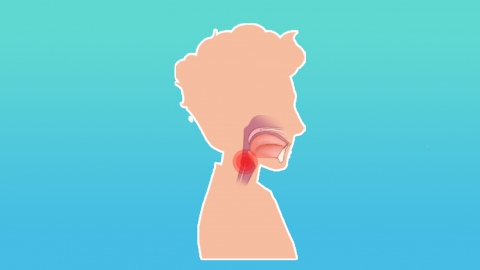What should I do for a dry and sore throat?
Generally speaking, the term "throat" refers to the pharynx. Dryness and soreness of the throat may be caused by factors such as insufficient water intake, excessive voice use, acute pharyngitis, reflux laryngitis, or chronic pharyngitis. Treatment options include general therapies and medications under a doctor's guidance. If symptoms persist or worsen, timely medical attention is recommended. The specific causes are analyzed as follows:

1. Insufficient Water Intake
The human body requires adequate daily water intake to maintain normal physiological functions. When water intake is insufficient, the mucous membranes of the throat gradually lose moisture, leading to dryness and irritation of nerve endings, which causes dryness and pain. It is important to ensure sufficient water intake daily. Additionally, avoid staying in dry environments for prolonged periods, such as air-conditioned or heated rooms. Using a humidifier can help increase air humidity.
2. Excessive Voice Use
Extended periods of loud speaking, singing, or shouting can overwork the throat muscles and mucous membranes, impairing local blood circulation and causing congestion and swelling of the pharyngeal mucosa, which leads to dryness and pain. It is recommended to use your voice appropriately, avoiding prolonged continuous speaking. If long periods of talking are necessary, take breaks and drink water frequently to soothe the throat.
3. Acute Pharyngitis
Acute pharyngitis may be caused by viral infections such as Coxsackievirus or adenovirus, or may secondarily develop from bacterial infections like streptococcus or staphylococcus. It may lead to acute inflammation of the pharyngeal mucosa and lymphatic tissues, with inflammatory stimulation of nerve endings causing dryness and sore throat. Symptoms may also include a burning sensation or a foreign body sensation in the throat. Treatment under a doctor's guidance may include medications such as compound borax mouthwash, Pudi Lan Xiao Yan oral liquid (Lonicerae Japonicae Folium and Taraxaci Herba oral solution), or amoxicillin capsules.
4. Reflux Laryngitis
Reflux laryngitis is usually caused by dysfunction of the lower esophageal sphincter. Stomach acid and gastric contents reflux into the throat area, irritating and damaging the throat mucosa, causing inflammation and resulting in dryness and pain. Symptoms may also include heartburn, acid regurgitation, and hoarseness. Treatment under medical advice may involve oral medications such as omeprazole enteric-coated capsules, rabeprazole sodium enteric-coated tablets, or domperidone tablets.
5. Chronic Pharyngitis
Chronic pharyngitis may develop due to repeated episodes of acute pharyngitis, various nasal conditions, or chronic inflammation of the respiratory tract, as well as long-term mouth breathing and repeated irritation of the throat by inflammatory secretions. Chronic inflammation of the pharyngeal mucosa and submucosal tissues causes thickening of the mucosa and lymphoid hyperplasia, leading to persistent throat dryness and pain. Symptoms may also include irritation-induced coughing. Medications such as cetiridine iodide lozenges, Qing Hou Li Yan granules (throat-clearing and pharynx-soothing granules), or budesonide suspension for inhalation should be used according to medical instructions to relieve symptoms.
In daily life, maintaining sufficient sleep and engaging in appropriate physical exercise can help enhance immune function and prevent illness. Avoid excessive voice use or loud shouting to reduce damage and irritation to the throat.







